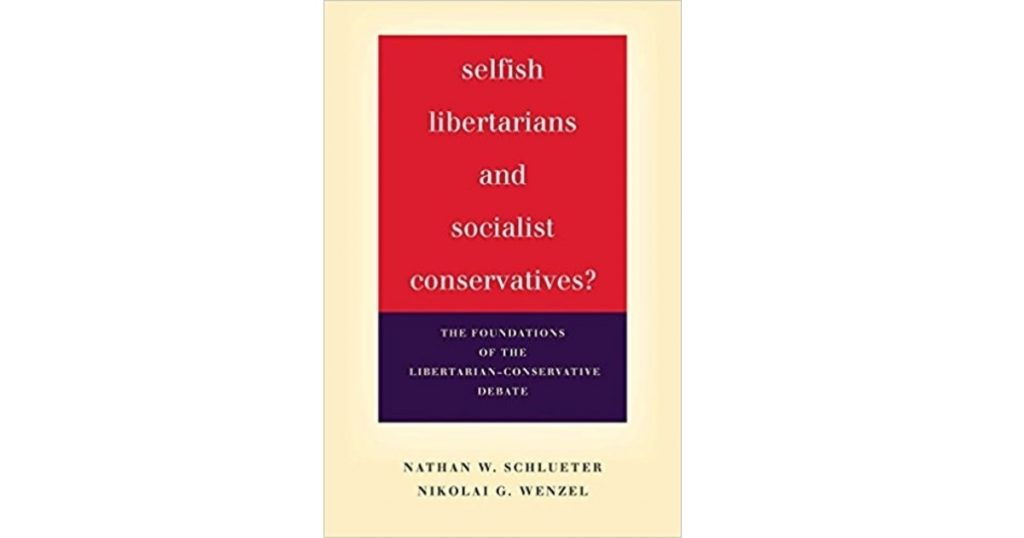Last year’s presidential primaries revealed deep internal fault lines in both the contemporary Left and Right. Though conservatives have long been aware of principled disagreements among those within their camp, the Obama years allowed them, for the most part, to paper over disputes about exactly how limited the government should be. Everyone associated with the Tea Party, at least, could agree that government should be more limited than it was under the leadership of President Obama, Nancy Pelosi, and Harry Reid. As 2016 unfolded, advocates of limited government looked forward to a new era in American politics.
But the divisions on the Right reemerged during the Republican primaries with renewed force, and the persistence and ultimate success of the Trump campaign have challenged conservatives and libertarians to think through their positions anew. Libertarianism and conservatism still have a common enemy in progressivism and its bureaucratic offspring, the administrative state—that much, they can agree on—but attempts to unify the conservative and libertarian camps have not proven successful. The fusionism of years past has collapsed almost entirely, and efforts to revive it through “Conservatarianism” or similar means are unpromising. Furthermore, the tribal in-fighting among conservatives and between libertarian and conservative groups has spread the cup of bitterness. Can they find a new path forward? Perhaps the way to begin is by considering where the argument stands.
Those, especially newcomers, looking to survey the field will find helpful a new, book-length debate by Nathan Schlueter, a professor of philosophy, and Nikolai Wenzel, a professor of economics. In Selfish Libertarians and Socialist Conservatives: The Foundations of the Libertarian-Conservative Debate, Schlueter and Wenzel present the fundamental basis for each position, conservative and libertarian. Both authors lament the simplistic arguments made against both libertarianism and conservatism; they aim to explain the basis for their respective positions while mounting sustained critiques of the other point of view. Both clarify their positions through practical examples—examining the policy questions of immigration, education, and marriage—before each has the chance for concluding remarks.
American Conservatism and Minarchist Libertarianism
Start your day with Public Discourse
Sign up and get our daily essays sent straight to your inbox.First, each author presents his positive case. Schlueter opens the book with a defense of what he calls “American conservatism,” which corrects the errors of other forms of conservatism (such as neo-conservatism or paleo-conservatism) while retaining their best elements. He describes this form of conservatism as a “natural law liberalism,” a version of classical liberalism that maintains the “equilibrium of liberty” by balancing the vital and interdependent factors of liberty, tradition, and reason. He writes that “American conservatism is committed to conserving the principles of the American founding, and to renewing the models of political leadership that gave those principles life.” The American founders achieved such an equilibrium, Schlueter explains, by recognizing how fragile the conditions of liberty are.
Devotion to an abstract liberty as the highest political good turns out to endanger liberty; good traditions and reasoned arguments are necessary supports of freedom. Real conservatives recognize the errors of the French revolutionaries, but they also recognize that the natural rights theories of the American founding are essential for preserving liberty today. Indeed, it is precisely the natural law liberalism of the American founders that brought all three elements together in America.
Wenzel argues the case for libertarianism. As an economist, he sets his sights lower than the sort of rights-based libertarianism that might be defended from a philosophical perspective. Emphasizing instead the insights into “robust political economy” made by public choice theory and the Austrian School of economics, he prefers to employ the tools of economic analysis to argue for certain institutional arrangements that best limit government to securing rights and nothing more.
He writes that “people are not omniscient and cannot be assumed to be benevolent,” and therefore the duty of the government cannot be more than securing the individual rights of each citizen. On account of the problems of knowledge and incentives that political actors face, almost any government action devolves into more and more regulation and disruption of the lives of its citizens. Example after example can be cited, Wenzel argues, to demonstrate that good intentions of government regulators lead to negative outcomes. Thus Wenzel defends the “minarchist” form of libertarianism, as opposed to anarcho-capitalism or “thicker” forms of classical liberalism that allow for government correction of supposed market failures.
The Debate
The dynamic of the book shifts when the co-authors turn to critique each other’s position. Wenzel begins, arguing that Schlueter’s conservatism is internally inconsistent, arbitrary in its preferences, and ultimately a danger to liberty. He is skeptical of conservatism’s claims to know an objective moral order. Humans are fallible. We have limited abilities to discover an objective moral order, to explain the differences between various accounts of the moral order, and to make sense of the continual revisions even of natural law theories. Without retreating into full moral relativism, Wenzel wants us to recognize with Friedrich Hayek the reality of the “knowledge problem,” and to keep ourselves from imposing what amount to private preferences through public means.
Wenzel also remains suspicious of the claim that the state can support virtue. As he puts it, how can a government that can barely teach basic literacy in its public schools be expected to teach civics successfully? He pushes against superficial justifications of morals regulations that serve the “common good,” arguing that the only truly common good is an institutional framework “within which individuals can peacefully cooperate.” Only here, where individuals are free to pursue and define their own ends, can we speak of a genuine common good.
Wenzel’s argument then moves to a critique of the American founding. He charges the American founders with making an inadequate defense of liberty, even while he admits that the US Constitution was a “mostly” libertarian document. A glaring problem within the Constitution is its toleration of African slavery, but he raises other questions about its provision for using the militia to suppress insurrections and the Constitution’s definition of treason. Still more dangerous are its vaguely worded clauses about government acting for “the general welfare” or doing whatever is “necessary and proper,” phrases that pave “the road for redistribution, social engineering, and the rent-seeking gravy train.” Wenzel reads the Constitution through the synthesis of Charles Beard with Gordon Wood’s later view that the Constitution of 1787 was a betrayal of the Revolution, and Wenzel concludes that it “can thus be seen as a thoroughly aristocratic document that entrenched many existing power structures at the expense of liberty. . . .” A political orientation based on such a document must naturally lead to increasing government intervention, contrary to the desires of even the advocates of natural law liberalism.
Schlueter in his turn objects to the libertarian tendency to reduce all of politics to economics. Wenzel’s turn to a “robust political economy” analysis of politics suggests its overly reductive character. Political life is messy because it is human. To reduce man’s behavior to an economic model necessarily fails to do justice to the full range of human activities, desires, and aspirations. Schlueter pushes us to ask: are the members of a society mere production-and-consumption machines, or are they citizens of a regime? Citizens, he says, “recognize the good of political association—common legal institutions, common history, common national heroes, common symbols like flags and monuments, and common traditions of language, custom, celebration and practice—as one’s own good” (emphasis in original). The classical political philosophers recognized this fact, as did the American founders when they drafted the nation’s earliest fundamental laws.
One of the more serious challenges to Schlueter’s conservatism is Wenzel’s critique of the conservative claim to comprehend an objective moral order. Schlueter responds to it in some detail, but perhaps his most forceful answer is to point out that Wenzel’s skepticism of moral knowledge undermines the libertarian position as much as (and perhaps more than) the conservative. Wenzel, following Hayek, wants to reduce all “competing conceptions of the good” down to “subjective personal preferences.” While Schlueter agrees that subjective private preferences should not be imposed through the coercion of the state, he emphasizes the distinction between moral principles—which do not depend on whether the individual likes them or not—and mere preferences. Some actions harm individuals, whether they engage in them voluntarily or not; other actions harm nonconsenting third parties, even if those harms are not physical. Instead of asking the regime to be morally neutral in its laws, which Schlueter says is “in principle impossible,” we should ask the citizens to ask for and offer public reasons for the policies they support or oppose. This is the only alternative to a regime that masquerades as neutral while in fact dogmatically, if tacitly, asserting its own ends for all citizens.
Toward a Verdict
The authors are able to engage in serious disagreement about the fundamentals of government and to do so civilly, but this does not mean that both arguments are equally persuasive. In addition to the critiques of libertarianism made by Schlueter in the course of the book, the perceptive student of history will find a great deal that is objectionable in Wenzel’s handling of historical matters, particularly with regard to the American founding and the Constitution.
Moreover, the thoughtful student of political theory should find fault with the libertarian definition of government: is it only coercion and force, or, as Schlueter argues, does it also help to educate the people through laws? While the law may not be able to make men moral, it can provide the conditions for promoting virtue and morality. Governments do far more than use force to coerce individuals; public laws teach us how to think. As Schlueter points out, we have only to look at the changes in public opinion that follow major Supreme Court decisions to see how much influence they carry in the public mind. The racist attitudes of the Jim Crow era were quickly invalidated by a few landmark decisions in the 1950s and 60s. Conversely, Court decisions that permitted increased pornography and profanity in public have led to markedly changed attitudes about pornography and acceptable sexual activities more generally.
On the converse, the student of today’s political environment might find Schlueter’s conservatism appealing but unrelated to what passes for conservatism as practiced in much of public life. The inconsistency of some politicians on the Right gives credibility to Wenzel’s complaints about conservative ideas leading to cronyism. One might even say that Schlueter defends a rarefied conservatism. If seen in practice, it would deserve great praise—but how many Republicans in the US House or Senate truly adhere to his description of conservatism? One wishes more names came to mind.
If that is the case, does Schlueter give us a practical conservatism or one that belongs to discussions in the ivory tower? We must hope that it is both. A conservatism rooted in the principles of the American founding and a defense of the Constitution must be intellectually defensible and practically workable. The burden for thoughtful conservatives—and for all who love liberty—going forward is to find a way to bring them together. Schlueter has given us such a conservatism, but explaining and implementing it in specific policies remains a formidable challenge.
Perhaps a beginning can be made by viewing Schlueter’s natural law liberalism as the basis for a stronger political coalition—a classical liberal “fusionism” of sorts. On the political level, Schlueter’s emphasis on the equilibrium of liberty, reason, and tradition might gain the support of libertarians who stand in the “thicker” classical liberal tradition. The elements of Schlueter’s conservatism align with the main emphases of the Tea Party movement, marking its potential for political potency. As a long-term strategy, a conservatism that draws on the customs of the people, the reasoned truths of the founding, and the defense of individual freedom holds out the promise of success.













